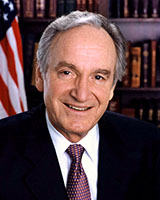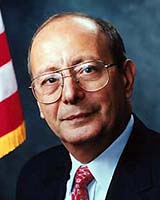Moments in Disability History 21
S.933 – Americans with Disabilities Act – 101st Congress
Late into the night on September 7, 1989, the United States Senate voted overwhelmingly (76-8) in favor of the Americans with Disabilities Act (ADA) (S.933, Senate Report 101-116). The vote took place after a lengthy Senate floor debate and after fending off many amendments which would have severely limited the scope of its coverage. Those who spoke in favor of S.933:

United States Senator Tom Harkin
"So, Mr. President, on behalf of my brother who is deaf, my nephew who is quadriplegic, and the 43 million Americans with disabilities, today we introduce this historic legislation—the Americans With Disabilities Act. Let's celebrate the 25th anniversary of the enactment of the Civil Rights Act of 1964 by passing the ADA this year and finally recognize the civil rights of Americans with disabilities."
Senator Tom Harkin (IA)

United States Senator Ted Kennedy
"This really is the Emancipation Proclamation for the disabled in the country…a proud day in the history of Civil Rights."
Senator Ted Kennedy (MA)

United States Senator Al D'Amato
"Few are able to truly understand the struggle faced daily by millions of Americans with disabilities. The barriers the disabled must overcome in order to meet basic needs are many. Activities accomplished with ease by most—communicating, commuting, or entering the workplace—are often significant hurdles for those with disabilities. This legislation, Mr. President, will break down these barriers once and for all."
Senator Al D'Amato
Some of the amendments that did not pass included those regarding:
- Individuals with specific disorders such as compulsive gambling, kleptomania and pyromania;
- Coverage of the legislative branch of the United States government;
- A one year extension for compliance by private bus companies;
- A study of wilderness accessibility issues;
- Protection of people with sexual behavior disorders, users of drugs or alcohol, and people with organic brain disorders due to drug abuse.
A particularly vigorous exchange took place on September 7th between Senators Harkin and Helms on whether or not S.933 included or excluded "pedophiles", "schizophrenics", "kleptomania", "manic depressives", "psychotic disorders", "homosexuals", "transvestites" and HIV and AIDS.
- A brief history of Amendments to S.933 leading up to the vote on September 7, 1989.
- Senator Lowell Weicker, Jr. (CT) spoke as a parent of a child with a disability. His full testimony.
More on Senator Weicker's influence on the Americans with Disabilities Act, and many other pieces of public policy concerning people with disabilities, can be found in Moments in Disability History #13 in the ADA Legacy project at https://mn.gov/mnddc/ada-legacy/ada-legacy-moment13.html.
Sources
Congress.gov: Senate Bill 933 Amendments
The Minnesota Governor's Council on Developmental Disabilities: The ADA Legacy Project: Moments in Disability History 13 Lowell P. Weicker, Jr., Original 'Father' of the Americans with Disabilities Act





